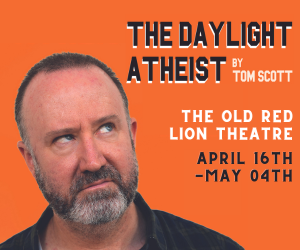Any list of famous Belgians must include the trio Georges Simenon, Audrey Hepburn and Jacques Brel. Brel has become the epitome of the French chansonnier, intense, dramatic, black polo-neck, despite his nationality and indeed the fact that French was his second language. He was brought up speaking Dutch, although he only wrote one song in his natal tongue.
Enough of the material survives the Broadway polish to hit you between the eyes, and two hours is no time at all. With luck over a run the performers will make the material more their own, become more immersed in it.
Brel’s era is the 1950s and early 1960s, with its associations with Beat Poetry and a certain hipness. However, his range of characters and of tone is far wider, his sympathies far more inclusive than that glib caricature might suggest. His output was prodigious, despite a song writing career which was effectively over before he reached forty - with the exception of his last album, ‘Les Marquises’, which was recorded in the shadow of his cancerous death at 48.
Brel wrote chansons; the difference between a chanson and a song is its particularity. Where a pop song will use ‘I’ or ‘you’ to mean a universal listener who can identify with it, a chanson’s ‘I’ and ‘you will be particular characters with specific relationships. The lyrics accordingly will be both concrete and dense. Brel, like Aznavour, is a singing actor, his songs dramatic monologues, delivered in his own performances with an attack, a bravura and ferocity which is totally uncompromising. Brel, unlike those influenced by him like Bowie, Leonard Cohen and Marc Almond, never tried to be liked. Paradoxically, this made him the more liked, even revered.
Putting together a show from his songs for the Broadway stage, Jacques Brel is alive and well… faced a dilemma. On the one hand, these songs were written for, and depend on, one performer establishing a personal rapport with his audience; on the other a ‘show’ in this sense demanded variety, production values, ensembles as well as solos. The combination doesn’t always work.
There are other compromises too, especially in the translations of the lyrics. These are by Eric Blau and Mort Shuman; Shuman was a Brill Building hack turning out bubble gum hits like ‘Sweets for my Sweet’ and ‘Viva Las Vegas’. Despite being bilingual in French and English, he inevitably compromised the uniqueness of the original. Song translation is always a tightrope walk between literal fidelity to the original and capturing the feel, the essence in a version which is a good song in English in its own right. Some of Shuman and Blau’s work falls between the two stools, and there are better translations to be had, notably by Des de Moor. This production throws in specious references to Iraq and Afghanistan, but fails to curb the homophobic references.
Does it matter? It does when a translation is opaque, or bland. Take Tom Robinson’s version of ‘Les Bourgeois’. Where Blau and Shuman have “The middle class are just like pigs/The older they get, the dumber they get/The middle class are just like pigs/The fatter they get, the less they regret” , Robinson has “Yuppie scum, smug and dumb/The richer they are, the thicker they get/Yuppie scum, smug and dumb/As they get old they all forget.” Not much difference in accuracy, but for vitality, for the raw demotic language, for the clear truth of the theme of the song, Robinson wins hands down.
Blau and Shuman Americanise. There’s a lot of smoothing down, and in some songs the meaning goes completely haywire compared with the original. This is not to say that there aren’t fine moments of poetry. “My death waits like an old roué/ so confident I’ll go his way”; “They’ve forgotten the tune/That their whisky voice croaks/Splitting the night/With the roar of their jokes.”
This production largely uses the material of the 2006 revival, albeit changing the order somewhat. Set on a stage with fringed table lamps and red velvet table cloths, cabaret tables along the front row, the soft intimate atmosphere it evokes contrasts sharply with the harshness of some of the material. The performers have to fight a long thin tube of a theatre in which it is difficult to get close to the audience. They work best in the solo numbers which allow them to act their scenes – ‘Funeral Tango’, about a man cynically watching the mourners at his own funeral, ‘Le Moribond’, where a man committing suicide says farewell to the best friend who drove him to it by screwing his wife’. Brel’s characteristic mode is a kind of resigned bitterness; uncharacteristic then, and misleading, to top and tail the show with his “Quand on n’a que l’Amour” (“When one only has love”) which is a kind of ‘We’ll conquer everything” anthem which is out of character.
Of the performers, only Eve Polycarpou really captures the intensity and anger of the original. Her gutsy, guttural mezzo attacks your ears with the proper authority. She gets to do the two numbers which are presented in the original language, Brel’s famous ‘Ne Me Quitte Pas’, and his one Dutch song, ‘Marieke’. Paradoxically, it is these two numbers in the original which have the greatest emotional impact. David Burt seizes his chance in ‘Le Moribond’ from the moment his hand emerges Dracula-like from his coffin. But, Eve excepted, it all seems too polite, too overly acted. Where rather under-rehearsed production numbers are inserted, they detract from the individual performer-audience relationship. The arrangements, and Dean Austen’s pianism, are superb.
Enough of the material survives the Broadway polish to hit you between the eyes, and two hours is no time at all. With luck over a run the performers will make the material more their own, become more immersed in it. Above all, the show needs more danger.









